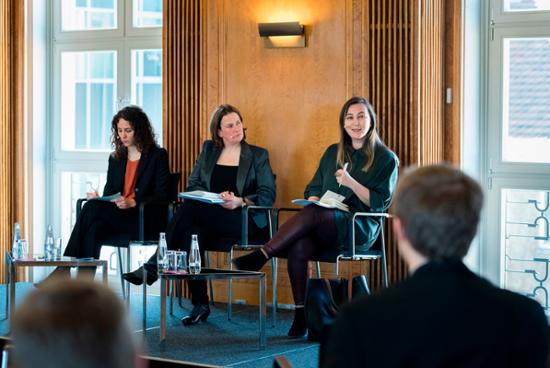Sie befinden sich hier: Institut Das Institut Büro Berlin Veranstaltungen MPIL Momentum Momentum 01.04.19

On Monday, 1 April 2019 the Max Planck Institute for Comparative Public Law and International Law hosted a panel discussion as part of the series MPIL Momentum with the title Backlash, Compliance, and Institutional Architecture: Current Challenges to the Implementation of ECtHR Judgements. The panelists were Basak Çalı, (Professor of International Law at the Hertie School of Governance and Director of the Center for Global Public Law at Koç University, Istanbul) and Raffaela Kunz of the Institute, the discussion was moderated by Alexandra Kemmerer.
Setting out from a contextual analysis of recent judgements of the European Court of Human rights (ECtHR), the panelists discussed institutional and jurisprudential coping strategies in view of current challenges faced by the ECtHR such as a massive case overload as well as implementation deficiencies and pushbacks which might lead to systematic backlash.
First, the architecture of the European Court of Human Rights, such as the Court and the Committee of Ministers (CM), and their main tasks were explained. In the following the speakers analyzed how the Court is trying to reduce its heavy workload, e.g. by making use of pilot judgements or inadmissibility decisions. This was illustrated on the basis of the judgements Ilgar Mammadov v. Azerbaijan or Yuriy Nikolayevich Ivanov v. Ukraine.
Second, the panelists pointed out the different types of resistance and illustrated the Court’s coping strategies. Concerning this, the speakers discussed the current usage of the margin of appreciation as well as the phenomenon of so-called “alarm-bell-judgements”. These coping strategies were further developed in recent years and might be interpreted as signs signaling a politicization of the Court, and the speakers discussed whether this development should be viewed as favorable or not.
The audience included a number of distinguished experts, both from academia and legal practice - among them Lorenz Barth (Head of the Council of Europe Unit, Federal Foreign Office) and Nicola Wenzel (Head of the Human Rights Division of the Federal Ministry of Justice and Consumer Protection, and Government Agent for Germany before the ECtHR). In a rich and fruitful discussion, the panelists were confronted with pointed questions, addressing the variety of different judicial opinions within the Court, the role of the CM in procedure, law and politics, and the Strasbourg system’s position and prospect in a shifting geopolitical situation.
Report: Aliki Kosmidis
Foto: Jordis Schlösser/Ostkreuz
At the Berlin-Brandenburg Academy of Sciences (BBAW).